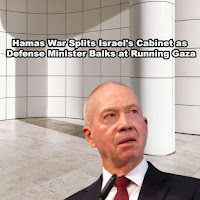In a dramatic turn of events, Israel's government finds itself embroiled in internal strife as the conflict with Hamas in Gaza escalates. The rift deepened this week when Defense Minister Yoav Gallant challenged Prime Minister Benjamin Netanyahu's handling of the situation, demanding a clear strategy for the ongoing battle.
Gallant's stance, refusing to endorse the establishment of a military government in Gaza post-conflict, highlights growing discontent within the security establishment regarding Netanyahu's leadership. This discord underscores the division between centrist figures like Benny Gantz and Gadi Eisenkot, who support Gallant, and hard-right nationalist factions led by Finance Minister Bezalel Smotrich and Internal Security Minister Itamar Ben-Gvir, who oppose him.
The clash between Gallant and Netanyahu symbolizes broader ideological differences within the Israeli government. While Netanyahu aims for a decisive victory over Hamas, his lack of a clear post-conflict plan raises concerns among both military and civilian leaders. The absence of a defined strategy beyond dismantling Hamas leaves uncertainties about Gaza's governance and the region's stability moving forward.
As the conflict persists, concerns over the economic and military toll on Israel mount. Estimates suggest that maintaining a military presence in Gaza could cost billions annually, straining both finances and manpower. With the potential need for tens of thousands of troops to secure the region, Israel faces the dilemma of reallocating resources from other volatile areas, like the Lebanese border.
Despite significant casualties among Hamas fighters, the group's resilience poses a persistent threat to Israeli forces. Smaller militant factions continue to operate, complicating the military's efforts to secure previously cleared territories. Recent "friendly fire" incidents highlight the complexity of urban warfare and the risks associated with prolonged engagements.
Beyond the battlefield, the conflict exacerbates existing social and political tensions within Israeli society. Disputes over military conscription and religious influence further polarize public opinion, adding another layer of complexity to an already volatile situation. Netanyahu's delicate balancing act to maintain coalition unity becomes increasingly precarious as dissent within his cabinet grows.
As the conflict drags on, the path to resolution remains unclear. While most Israelis initially supported decisive action against Hamas, waning enthusiasm suggests a shifting public sentiment. The challenge for Netanyahu lies not only in securing a military victory but also in navigating the complex political landscape to maintain stability within his government.
In conclusion, Israel's response to the Gaza conflict reflects broader challenges facing the nation, from military strategy to internal politics. As the situation unfolds, the repercussions of this internal divide may shape Israel's future trajectory in the region.


.png)

.png)
0 Comments